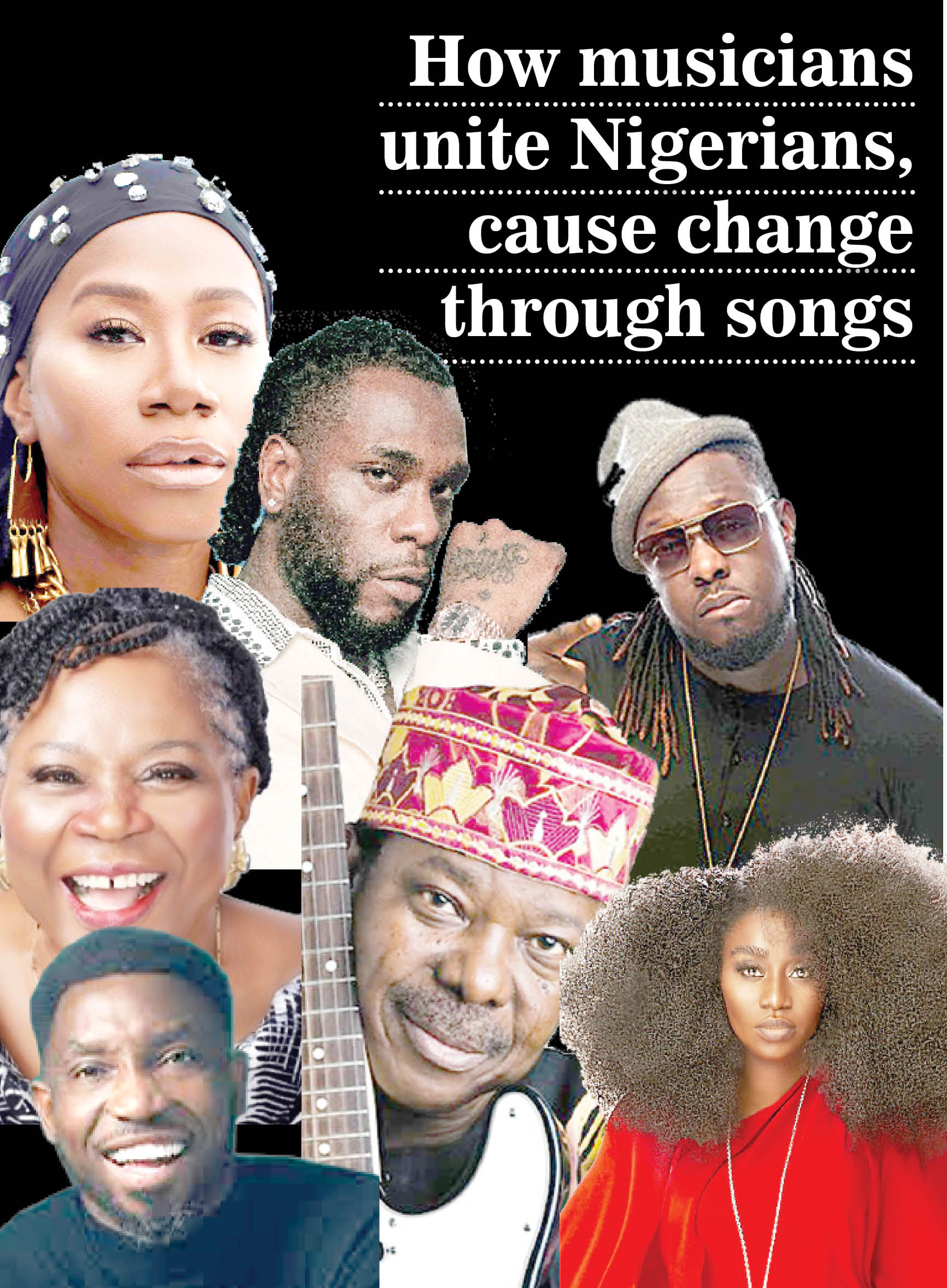How musicians unite Nigerians, cause change through songs
The music industry has always been a powerful tool for social commentary and a mirror reflecting the nation’s socio-political landscape. Throughout history, Nigerian artists have used their music to address issues of nation-building, unity, and bad governance. These songs have not only entertained but also inspired and mobilised the populace, urging them to strive for […]

how musicians unite nigerians, cause change through songs
The music industry has always been a powerful tool for social commentary and a mirror reflecting the nation’s socio-political landscape. Throughout history, Nigerian artists have used their music to address issues of nation-building, unity, and bad governance. These songs have not only entertained but also inspired and mobilised the populace, urging them to strive for a better Nigeria. In this feature, Weekend Trust gives a rundown of some of those songs.
“Nigeria My Beloved Country” by Funmi Adams
This iconic song from the 1980s is a classic in Nigerian patriotic music. It emphasises the importance of unity and collective effort in building the nation. The lyrics, “Nigeria, my beloved country, working together is the key,” resonate with the message of unity and cooperation as the foundation for national progress.
“Great Nation” by Timi Dakolo
Released in 2012, this song became an anthem of hope and patriotism. Timi Dakolo’s powerful vocals convey a message of unity in diversity and the promise of a brighter future for Nigeria. The song urges Nigerians to take active steps in building and defending their country, emphasising that unity is crucial for the nation’s success.
“Greenland” by TY Bello
Released in 2007, this song celebrates Nigeria’s abundance and encourages citizens to move away from fear to a land of hope and possibilities, promoting national pride and unity.
“One Love” by Onyeka Onwenu
Released in 1986, this classic hit emphasises unity and togetherness. The song’s message of love and peace resonates across cultures and religious boundaries, making it a staple at social gatherings and celebrations in Nigeria.
“Peace Song” by Onyeka Onwenu
A plea for peace and unity, this song’s inspiring lyrics and melodic composition make it a powerful anthem for harmony in a world often troubled by conflict.

Songs addressing bad governance
“Which Way Nigeria?” by Sonny Okosun
This classic from the late 1970s and early 1980s critiqued the inefficiencies and corruption in Nigerian governance. Sonny Okosun questioned the direction of the country and highlights issues such as indiscipline, greed, and unequal wealth distribution. The song’s slow, reflective beat draws attention to its profound lyrics, making it a powerful call for change.
“Nigeria Go Survive” by Veno Marioghae
A disco hit from 1984, this song was a beacon of hope during Nigeria’s challenging times under military rule. Sung in Pidgin English, it encouraged Nigerians to stay and build their country rather than fleeing to other countries. The memorable chorus and catchy rhythm made it a popular anthem, inspiring resilience and perseverance.
“This Is Nigeria” by Falz
Inspired by Childish Gambino’s “This Is America,” Falz’s 2018 release addresses contemporary issues like corruption, police brutality, and religious extremism. The song’s satirical lyrics and impactful visuals sparked widespread conversation and highlighted the persistent problems plaguing Nigeria. Despite facing a ban from the Nigerian Broadcasting Commission, it remains a significant piece of protest music.
“Jailer” and “Fire on the Mountain” by Asa
Released in 2007, Asa’s songs speak to systemic issues of police brutality and societal neglect. “Jailer” addresses the dehumanising treatment by authorities, while “Fire on the Mountain” warns of the impending chaos if these issues remain unresolved. Both tracks showcase Aṣa’s blend of introspective lyrics and compelling melodies, making them enduring protest anthems.
“The Way Forward” by King Sunny Ade
Composed after the annulment of the June 12, 1993 presidential election, this song calls for unity among all Nigerian tribes and collaborative efforts to make the nation great. It was remixed in 2003 to remind Nigerians of their collective strength.
“Jaga Jaga” by Eedris Abdulkareem
This controversial song is a stark commentary on the corruption and disarray in Nigeria, calling for accountability and better governance.
Contemporary protest music
The #EndSARS movement in 2020 rekindled the tradition of protest music in Nigeria. Songs like “Mr. President” by African China and “Dem Mama” by Timaya gained renewed relevance during the protests against police brutality. Burna Boy’s “20.10.20” memorialises the tragic events of the Lekki toll gate shooting, with emotional lyrics that resonate deeply with the struggles for justice and accountability.
Murya Daya musical group recently released a song, ‘Illar zanga-zanga’ against the backdrop of the 2024 #endbadgovernance protest. The song, which was more of an advocacy call on Nigerians to shelve the protest and embrace dialogues, highlighting the unwanted consequences that may arise due to the protest. The group’s chairman, Ali Jita, is the lead musician, with El’Muaz Birniwa, Abubakar Sani, Yakubu Mohammed and many others contributing some lyrics.
Nigerian music will always play an important role in nation-building, fostering unity, and challenging bad governance. From the hopeful messages of Funmi Adams and Timi Dakolo to the critical voices of Sunny Okosun, Veno Marioghae, and Falz, these songs capture Nigeria’s ongoing quest for a better future. As new generations of artists emerge, the legacy of music as a force for social change remains strong.
